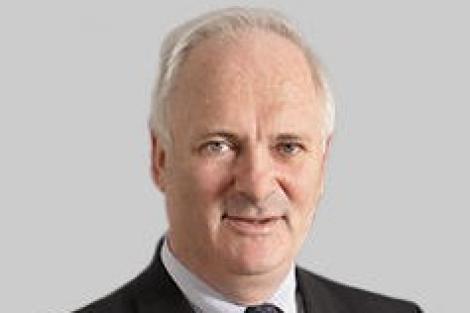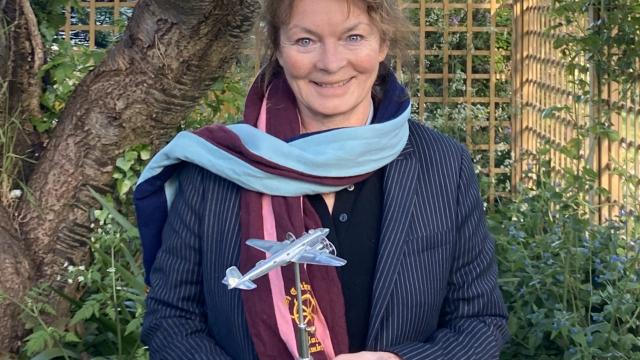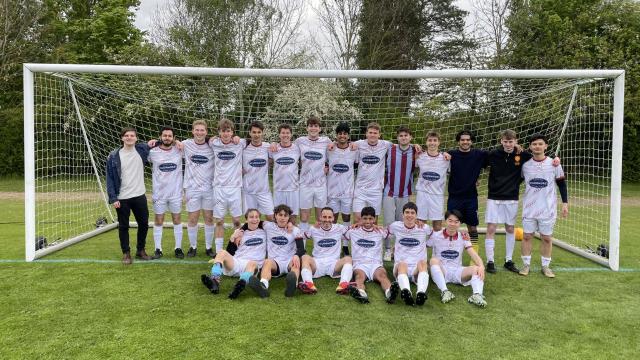
Sausages, squabbles and histories
Drawing on a lifetime in politics and a broad historical lens, former Taoiseach John Bruton (1994-1997) explores what’s in political leaders' heads when making key decisions and the bigger historical forces at play in Europe. Are British politicians pursuing a 500 year-old “grand strategy” of sewing division on the continent ? What inspirations and warnings can Ireland draw from its own history when seeking political resolution in the North? And is the EU fighting to protect the integrity of its borders and institutions or, as Professor Kalypso Nicolaïdis (EUI and Oxford) suggests, “squabbling over sausages when the world is on fire”?
Scroll down for:
- Executive summary
- About the speaker and discussant
- Watch the conversation
- Read about the conversation
Executive Summary
Barry and Eugenio are joined by Professor Kalypso Nicolaïdis (St Antony’s College, Oxford) and former Taoiseach John Bruton (Fine Gael) to discuss the Northern Ireland Protocol and the future of the island of Ireland. They debate the conflicting incentives facing political leaders over the Northern Ireland Protocol (NIP), the relative importance of clashes over the NIP compared to other geopolitical issues, and the possibility of Irish reunification.
- We need to see tensions over the Northern Ireland Protocol through a “broad historical and conceptual framework” rather than just following the latest developments in the news cycle. The British government’s approach to the NIP is driven not just by short-term electoral incentives and political instinct, but also a 500 year-old “grand strategy” of sewing “division” in Europe and undermining attempts at European political unity.
- Professor Nicolaïdes argues that clashes over the NIP are a dangerous distraction from global geopolitical issues. They reflect a “strategic blindness” with both parties fundamentally aligned on political values and goals when compared to Russia, China and other rival states.
- Bruton disagrees with this, emphasising the EU’s unprecedented historical achievement in securing peace in Europe through democratic consent and international cooperation. He argues for the legitimacy of the EU defending the integrity of the Single Market and EU law, and warns EU members will “pay a high price” to do so.
- Bruton calls for more “realism” in politics across the island of Ireland. He expresses his admiration for realists in Irish history – those who “accepted a treaty in 1921 even though it wasn’t all we might have wished for”. He also calls for “much greater efforts of imagination” to “see ourselves in the shoes of our traditional antagonists” rather than “parade our identity”.
- Bruton would personally “like to see a united Ireland”, but doesn’t think it’s a “practical proposition in current circumstances, or in foreseeable circumstances”. He believes that citizens in the Republic would not ultimately be willing “to make the sacrifices in terms of lives and money that would be necessary to sustain unity” in the face of “determined” Unionist opposition, and in the event of a border poll people should vote based on realistic predictions of the future, rather than idealism.
About the speaker
John Bruton was Taoiseach (Prime Minister) of Ireland from 1994-1997. First elected to Dáil Éireann in 1969, John served continuously as a member until 2004. In the 1970s, he was Parliamentary Secretary in the Departments of Education, and Industry and Commerce. In the 1980s, he served as Minister for Finance (twice), Minister for Industry and Energy, and as Minister for Industry, Trade, Commerce and Tourism. He was Leader of Fine Gael from 1990 to 2001. From 2002 to 2003, John was a member of the presidency of the Convention on the Future of Europe, which did the bulk of the drafting work of the EU's Lisbon Treaty. From 2004-2009, John was EU Ambassador to the United States. Currently, he is a member of the boards of Trane Technologies, of the Irish Diaspora Loan Origination Fund, of Pimco Europe and of the European Advisory board of Eli Lilly. John is also a member of the board of the Centre for European Policy Studies, of Cooperation Ireland, of the Irish Institute for International and European Affairs, and of the Club de Madrid. John graduated from University College Dublin with a Bachelor of Arts degree in economics and politics in 1968, before being called to the Bar of Ireland in 1972. He is author of Faith in Politics, a collection of essays on politics, economics and religion, published by the Currach Press in 2015. His website is www.johnbruton.com
About the discussant
John's discussant is Kalypso Nicolaïdes, Professor at the School of Transnational Governance (EUI, Florence), and Professor of International Relations at the University of Oxford.
Watch the conversation
What was said?
John Bruton has been in politics a long time. He draws on decades of political experience to discuss and debate European and Irish politics.
Professor Nicolaïdes asks whether Bruton sees the British Government’s objections to the current Protocol arrangements as merely an attempt to “whip up [...] jingoistic sentiment”, or as part of a commitment to “getting Brexit done”.
Bruton encourages us to see EU-UK tensions over the Northern Ireland Protocol through a “broad historical and conceptual framework” rather than just following the latest developments in the news cycle. Politicians are often following multiple strategies simultaneously and may not be “fully conscious” of their overall approach – or even “able to articulate it”. “Instinct” is key in political decision-making. But he has an appreciation for the longue durée.“British grand strategy over the last 500 years has always been that of maintaining division on the continent of Europe” and undermining any attempt at European unity. Bruton does not believe the whole of the Johnson government is pursuing this “deeply Machiavellian” strategy, but does think an element within it is.
Bruton wholeheartedly defends the EU’s position on the Northern Ireland Protocol. He criticises British threats to activate Article 16, which would allow Westminster to make exemptions to NIP rules in cases where the Protocol leads to “serious economic, societal or environmental difficulties that are liable to persist, or to diversion of trade”. He says that Article 16 was intended for an unexpected “emergency”, whereas “some diversion of trade to North-South, rather than East-West, was entirely foreseeable”.
Bruton objects to Nicolaïdes’ comment that “there is strategic blindness, in the UK but also in the EU, in squabbling over sausages when the world is on fire”. He says, “We are not squabbling over sausages. The EU is maintaining the single market”, which depends on “uniform and mutually recognisable” standards across member states. “I particularly like sausages myself. I don’t regard them as anything to be dismissed in a light-hearted way. A bad sausage could kill you” if it contained “certain toxins” and the need for consumer standards extends across all categories of goods.
Nicolaïdes emphasises again that Britain, not just the EU, is responsible for “squabbling” in their own particular ways. “The strategic challenges of our world are objectively so great”. The EU and UK’s values are so closely "compared in relative terms vis a vis China, Russia and others” that both parties should be “able to find a rational way through this”. Nicolaïdes holds out hope for rationality, “technical” solutions, and “goodwill” breaking through the Brexit deadlock.
Bruton does not believe the EU is squabbling. He says later, “We don’t expect Britain to make any further concessions; we simply ask Britain to implement agreements that were already made.” He sees the European Union as not just upholding pre-existing agreements, but defending the “existential issue of the integrity of the single market and the integrity of our judicial system”. Bruton emphasises the importance of the EU as a historical development; it is “the greatest voluntary peace process in European history”, with previous peaces the work of empires and great powers forged through “force” and conquest, rather than “consent”. EU member states, particularly older ones, feel intensely that they have “created something that must endure, and will endure”, and will make “significant sacrifices” to ensure this.
Despite these warnings of EU determination, Bruton is not encouraging brinksmanship. He believes the UK is using Article 16 as a “nuclear” threat, which raises the risk of “economic war”. Here he draws on the British-Irish trade war of the 1930s as a cautionary historical lesson; the 1930s, a decade defined in Europe by the breakdown of international treaties and retaliatory trade sanctions, “did not end well”. His “number one worry” is the severe and damaging effects such a trade war would have on Ireland.
Bruton believes that Brexit has disrupted the careful political balance that sustained the Good Friday Agreement (GFA). The GFA relied on “large applications of constructive ambiguity or fudge, if you like”, as to the national and constitutional status of Northern Ireland, which has now been undermined as the UK makes “territorial sovereignty” the “be all and end all of everything”. However, he does not see Irish reunification as the solution to this destabilization of the GFA.
Although he would personally “like to see a united Ireland”, he doesn’t think it’s a “practical proposition, in current circumstances, or in foreseeable circumstances”. He believes that citizens in the Republic would not ultimately be willing to “make the sacrifices in terms of lives and money that would be necessary to sustain unity if there was a very determined recalcitrant minority in the North-East of Ireland that just wouldn’t accept it.” He doesn’t like the image of Garda officers trying to police insurrection in 80-90% Unionist enclaves. In the event of a border poll, Bruton thinks people should vote based on realism - rational predictions of the future, rather than idealism.
Bruton roots such realism in historical precedent: “The people in Irish history that I applaud are realists, the people that accepted a treaty ... even though it wasn’t all we might have wished for.” He also calls for more empathetic imagination in Irish politics: “We need to make much greater efforts of imagination – the imagination to see ourselves in the shoes of our traditional antagonists”. Dublin nationalists must put themselves in the shoes of those on the Shankill, and people in Ballymena must likewise imagine how they would think had they grown up in Ballybunion. Bruton believes that Irish people, North and South, are traditionally “loath to make” such efforts of imagination, and prefer to “parade our identity”, but such a cognitive shift is necessary: “We have had too much identity politics. We need more practical politics."




